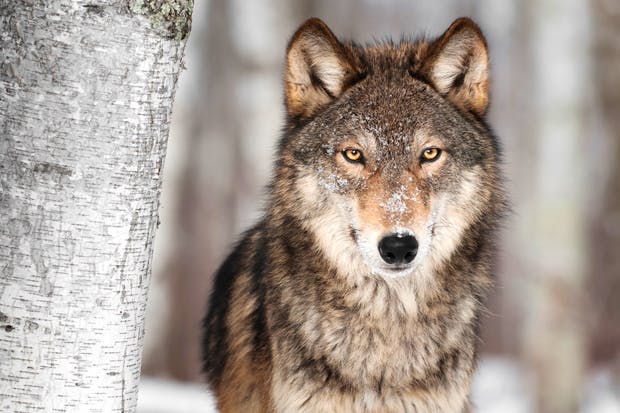A year ago there was a confirmed sighting, and even film, of a wild wolf in the Netherlands for the first time in perhaps 150 years. It was hanging out near a farm, a few kilometres from the German border in the north-east of the country, looking bored. A couple of years previously a dead wolf was found 40 miles to the west, well inside the Netherlands, but the locals thought it was probably a hoax. Almost certainly it wasn’t. Wolves are doing well in western Europe — there have been plenty of sightings in neighbouring Belgium, for example. France, Italy, Switzerland, Portugal, Spain and Germany have reasonably healthy populations and there are a few score in Scandinavia, too. Mostly they are isolated packs, though, some of them the consequence of reintroductions (i.e. rewilding).
Nobody is terribly worried about any of this. Farmers get compensation for sheep predations and the rest of the population seem very happy to have these animals in their midst, because despite their fearsome reputation, there have been only eight fatal attacks upon humans in all of Europe and Russia combined in the last 50 years. Compare that to attacks by cows (74 deaths in 15 years in the UK alone). It is good news that the wolves are now spreading of their own volition. Perhaps those packs will be isolated no longer. Isolated packs run the risk of chronic inbreeding and deformities, which has happened in Michigan.
They still can’t get across the channel, though, despite Eurostar. They will need our help. I was thinking about this when I read Melissa Kite’s attack upon ‘rewilding’ in last week’s magazine, which seemed to suggest that the only animal allowed to exist in this country should be her bloody horse, clip-clop. I would have thought it ill behoves someone called Kite to complain about rewilding when so many of her kin have benefited from this process: Melissa’s family can be seen soaring above the Chilterns in one of the most successful rewilding operations ever undertaken in this country. It may well be that Melissa thinks they get in the way of her view of the planes descending into Heathrow, but most people seem to like them and they have provided a fillip to the tourist industry. Melissa’s other objections were predicated upon the supposition that proponents of rewilding are maniacal lefties and the allegation that conservation work on heathland has made the area less ‘nice’ for her and her horsey. Well, on the first point, sure — George Moonbat Monbiot is indeed a proponent of rewilding and almost everything he says about anything is wrong. But only almost. On this he is surely right.
Wolves are a very long way from being reintroduced to the UK, despite a number of encouraging studies, but I hope that one day soon we will do it. The countries with the largest populations of wolves — Russia and Kazakhstan, for example — allow them to be hunted: so their numbers will continue to dwindle. Call it a first-world luxury, if you like, but it is only in western Europe and the USA that wolves are afforded proper protection. Which is one reason why we should play our part, having exterminated the creatures from these shores more than 250 years ago. There are other reasons. Wolves would save farmers an awful lot of money in controlling red deer populations in Scotland and, furthermore, generate revenue from a tourist boom. People — other than Melissa — like looking at wild animals. I once paid what seemed at the time a small fortune to go wolf-trekking in Poland, most of the trip consisting of injunctions to sniff various animal turds in the rain. Hell, it beat Ayia Napa. But before the wolf, there is the Eurasian lynx; again, an animal recovering well in countries from which it was either completely or nearly wiped out (western Europe) but under threat elsewhere. Lynx are pussies; they don’t hurt nobody no how. One lynx will kill, on average, two sheep per year (in areas where there are lots of sheep): I think we can stretch to compensation payments for that, no? Or put them where there are no sheep. Imagine the tourist boom if there were lynx prowling the forests of, say, the North York Moors, 1,500 years after they left.
Already we have beavers back with us. There’s a Kent Wildlife Trust project on Romney Marsh where the absurd, toothy, bat-tailed critters are gnawing through trees and building their fatuous dams for no discernible purpose. There’s another official project in Knapdale in Scotland, just across the water from Jura, and an even more thriving unofficial colony on Tayside. Beavers are here again and have not noticeably discommoded Melissa and her horse. So, too, are wild boar — although officially they are still considered pests, for reasons which quite elude me.
And then there’s the pine marten. When I was 11 years old I saw a family of these creatures playing in the middle of a forest track near Applecross, in Scotland, at dusk. It was captivating. I have always loved these animals — they remind me a little bit of the talented and beautiful British actress Tara Fitzgerald, with their sharp chiselled features and bright little eyes. Extinct from England for more than a century, thanks largely to that bane of all British wildlife, the gamekeepers. As soon as I had resigned from the Labour party I transferred my 13 quid a month subs to the Vincent Wildlife Trust’s scheme to reintroduce the pine marten south of the border. Pine martens are both nicer than Corbyn and cleverer. And probably stand a better chance of winning the next general election.
It is a cliché that, pace Joni Mitchell, we don’t know what we’ve got till it’s gone. It is also true that we are mindful of animals only when they become so rare as to be on the verge of extinction. The others we too often consider — à la Melissa — an encumbrance. That, I would suggest, is a shortsighted approach. Rewild now.
Got something to add? Join the discussion and comment below.
Get 10 issues for just $10
Subscribe to The Spectator Australia today for the next 10 magazine issues, plus full online access, for just $10.















Comments
Don't miss out
Join the conversation with other Spectator Australia readers. Subscribe to leave a comment.
SUBSCRIBEAlready a subscriber? Log in